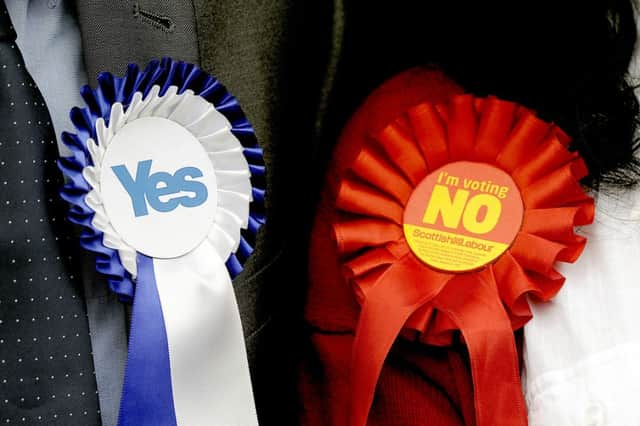Leaders: Scotland’s Jacques Parizeau moment


In fact, studies showed that among Scots-born voters, there was a majority for independence.
That voters born furth of Scotland were not very enthusiastic about a Yes vote was not much of a surprise. Many of these voters were English-born, and may well have had greater concerns than other voters about the survival of “the social union” after independence.
Advertisement
Hide AdAdvertisement
Hide AdAnd yet not too much was made about this finding at the time. It was an interesting talking point, and the source of a few conversations among strategists. But it did not become a major issue, and no-one publicly made the point that if Scotland had fewer incomers and immigrants, the prospects for independence would be much improved.
Until now, that is. Yesterday’s comments by former SNP deputy leader Jim Fairlie made that very point in the most explicit way imaginable.
For close observers of constitutional politics, this moment provided an echo of a notorious comment made in the wake of Quebec’s independence referendum in 1995, which the nationalists lost by the narrowest of margins.
In the immediate aftermath, Jacques Parizeau, a former Quebec premier from the main nationalist party, blamed defeat on “money and the ethnic vote” – an observation on the fact that immigrants to Quebec had voted overwhelmingly to hold together the Canadian federation.
Mr Fairlie is now in the unenviable position of being Scotland’s Jacques Parizeau. In fact, he seems to have gone further, by seeming to suggest that this insight could inform SNP policy decisions on immigration.
It would be naive to believe Mr Fairlie is the only campaigner for Scottish independence who takes this view.
Given the zealotry on display in the referendum, on both sides, it is fair to assume that there is a section of the public for whom independence or the Union is the most important thing in their worldview, taking precedence over absolutely anything else.
But the wave of criticism of Mr Fairlie on social media last night, especially from Yes supporters and the broader independence movement, as well as from the SNP itself, was deeply heartening.
Advertisement
Hide AdAdvertisement
Hide AdThey affirmed that some issues are more important than independence, and that a Yes victory achieved at the expense of Scotland’s openness to the outside world is no victory at all.
The comments made by Mr Fairlie yesterday have no place in any legitimate version of Scottish nationalism in 2015.
If Mr Fairlie’s outburst serves only to illustrate and entrench that truth, it will have been a worthwhile moment for the Scottish body politic.
HS2 is open to question
ED BALLS came under sustained political attack yesterday for hinting that a Labour government might delay or scale back the high-speed rail project HS2.
He was accused of betraying the economic interests of the North, and was challenged by Chancellor George Osborne to come clean about his true intentions.
Mr Balls was talking about phase two of the project, from Birmingham to Manchester and Leeds. He said “ big questions” would be asked about it.
Of course, here in Scotland we will have a long wait for the benefits of HS2 – if indeed the trains ever make it over the Border.
In fact, Alex Salmond’s recent intervention into the debate was to suggest HS2 start from Scotland and head south.
Advertisement
Hide AdAdvertisement
Hide AdMr Salmond, an economist by trade, knows full well that the economic case for the high-speed link is built on the growth that would be generated by improving incremental access to one of the world’s great economic powerhouses, London.
It is true that better rail links from Scotland to the north of England would be an excellent investment, with worthwhile returns. But when it comes to HS2, the sums would not add up if this particular project started from Scotland.
Is Mr Balls really betraying the North with his comments? Many regional leaders – including many from his own party – will be dismayed.
But at a time when Britain is re-examining its political and economic priorities, it is entirely reasonable to question whether this would be the most efficient, speedy and sustainable way of securing greater national economic growth.
FOLLOW US
SCOTSMAN TABLET AND MOBILE APPS